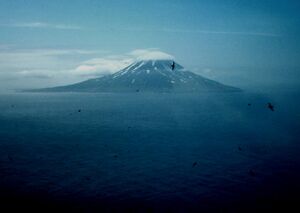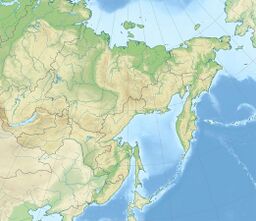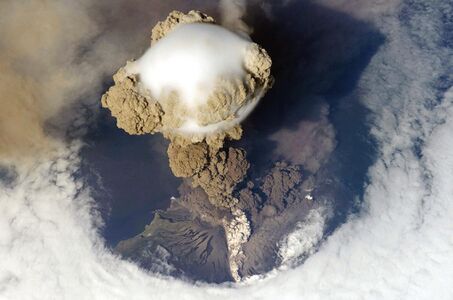Earth:Sarychev Peak
| Sarychev Peak | |
|---|---|
 Sarychev Peak on Matua Island, looking south from Raikoke. | |
| Highest point | |
| Elevation | 1,496 m (4,908 ft) |
| Prominence | 1,496 m (4,908 ft) |
| Coordinates | [ ⚑ ] : 48°05′31″N 153°12′00″E / 48.092°N 153.20°E |
| Geography | |
| Location | Matua, Kuril Islands, Russia |
| Geology | |
| Mountain type | Stratovolcano |
| Last eruption | 2021 |
Sarychev Peak (Russian: вулкан Пик Сарычева, Vulkan Sarycheva, variants: Japanese: 芙蓉山 Fuyō Mountain, [1] Fuyō-san, [2] Fuyō-yama, [3] Fuyo-zan, [4] Huyō San, Japanese: 松輪富士 Matsuwa-fuji)[5] is an active stratovolcano covering almost the entirety of Matua Island in the Kuril Islands, Russia . It is a young, highly symmetrical stratovolcanic cone. The height of the plume during the 2009 eruption was estimated at 12 to 18 kilometres (7.5 to 11.2 mi).[6]
History
The peak was named after admiral Gavril Sarychev of the Imperial Russian Navy.[citation needed]
2009 eruption
The volcano erupted June 11–21, 2009,[7][8] sending out ash plumes.[9] As the volcano is near some of the main air routes between East Asia and North America, there was some disruption to air traffic.[10]
File:Sarychev Peak eruption on 12 June 2009, oblique satellite view.ogv During an early stage of the eruption, on June 12, 2009, the International Space Station passed overhead and astronauts photographed the event.[11] A hole in the overhead clouds, possibly caused by the shock wave from the explosion, allowed a clear view of the plume and pyroclastic flow down the sides of the mountain. A cap-like pileus cloud is visible atop the rising column.[11]
Sarychev Peak previously erupted in 1760, 1805, 1879, 1923, 1927, 1928, 1930, 1932, 1946, 1954, 1960, 1965, 1976, 1986 and 1989.[7]
Gallery
See also
- List of volcanoes in Russia
References
- ↑ "Fuyō Mountain: Russia, in Geographic.org". http://geographic.org/geographic_names/name.php?uni=-4070885&fid=5059&c=russia. Retrieved 2010-08-12.
- ↑ "Fuyō-san: Russia, in Geographic.org". http://geographic.org/geographic_names/name.php?uni=-4070886&fid=5265&c=russia. Retrieved 2010-08-12.
- ↑ "Fuyō-yama: Russia, in Geographic.org". http://geographic.org/geographic_names/name.php?uni=-4070887&fid=5196&c=russia. Retrieved 2010-08-12.
- ↑ "Fuyō-zan: Russia in Geographic.org". http://geographic.org/geographic_names/name.php?uni=-4070888&fid=5401&c=russia. Retrieved 2010-08-12.
- ↑ "Huyō San: Russia in Geographic.org". http://www.geographic.org/geographic_names/name.php?uni=-4079993&fid=5401&c=russia. Retrieved 2010-08-12.
- ↑ "Sarychev Peak". https://www.volcanodiscovery.com/sarychev.html.
- ↑ 7.0 7.1 "Sarychev Peak: Eruptive History". Smithsonian Institution. https://volcano.si.edu/volcano.cfm?vn=290240.
- ↑ "Sarychev Peak". https://www.volcanodiscovery.com/sarychev.html.
- ↑ "Activity at Sarychev Peak". NASA Earth Observatory. http://earthobservatory.nasa.gov/NaturalHazards/view.php?id=38936.
- ↑ Air Canada (2009-06-15). "Travel Advisory For Flights to and from Vancouver and Tokyo, Seoul, Beijing, Shanghai and Hong Kong". http://www.aircanada.com/en/news/trav_adv/090615.html. Retrieved 2009-06-15.
- ↑ 11.0 11.1 "Sarychev Peak Eruption, Kuril Islands". NASA Earth Observatory. June 22, 2009. http://earthobservatory.nasa.gov/IOTD/view.php?id=38985&src=iotdrss.
External links
 |




